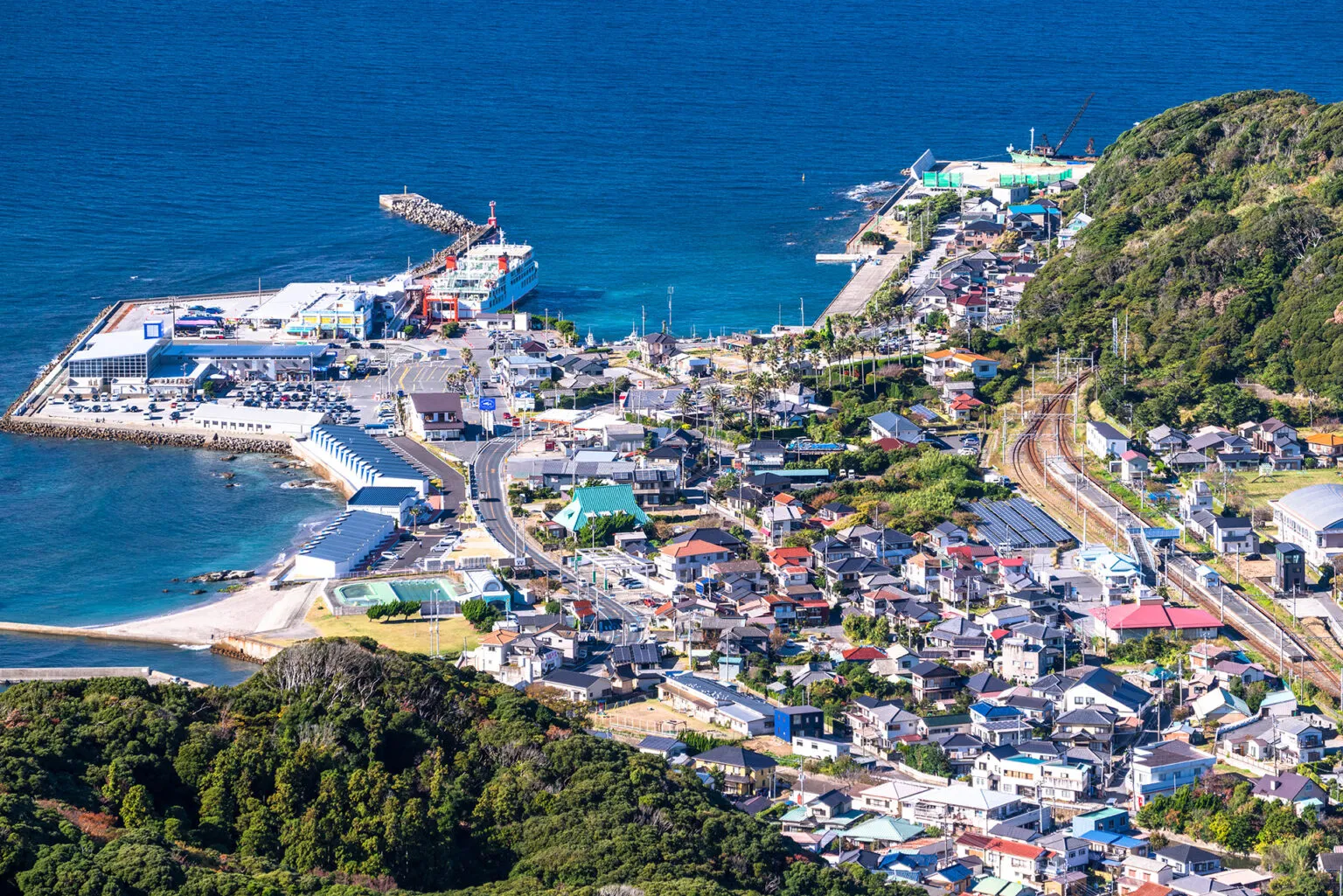
Things to Do | Visit Chiba | Latest update:2025/02/14
Contents
Kanaya | The Gateway to Mt. NokogiriKanaya Station | Information Center and Al porto CafeNokogiriyama Museum of ArtLunch at Pizza GONZOSouvenir Shopping at HammersStay at BAYSIDE KANAYAThis is the Visit Chiba guide to the charming port district of Kanaya, which is found at the base of Chiba’s Mt. Nokogiri. You may know Mt. Nokogiri as an adventurous day-trip destination just outside Tokyo, but much of the surrounding area remains mostly unknown to overseas visitors. We here at Visit Chiba took a trip to Kanaya so that we can dig deeper and share the local scoop with you. If you’re planning a Mt. Nokogiri trip, we certainly recommend spending some time here in Kanaya–and perhaps even staying the night–to further immerse yourself in this unique and accessible slice of Chiba. Get started with the information below.
If you’re coming to Mt. Nokogiri, you’ll first arrive here in Kanaya. Despite the mountain’s reputation as a “hidden gem” destination, Kanaya is accessible from Tokyo using public transportation. There are two main ways to get here via public transit: by taking the train to JR Hamakanaya Station, or by hopping on the Tokyo Bay Ferry. For those coming by train from Tokyo Station, the simplest route is to take the JR Sobu Rapid Line and to transfer to the JR Uchibo Line at either Kisarazu Station or Kimitsu Station. The train ride from Tokyo usually takes around 2 hours 15 minutes, but there are a few limited-express trains that can shorten the trip. For those coming from the Kanagawa area, or feel like a little seafaring, the Tokyo Bay Ferry will get you from the Kurihama Port in Yokosuka to Kanaya Port in about 40 minutes. More information about the ferry can be found here: https://en.tokyowanferry.com/
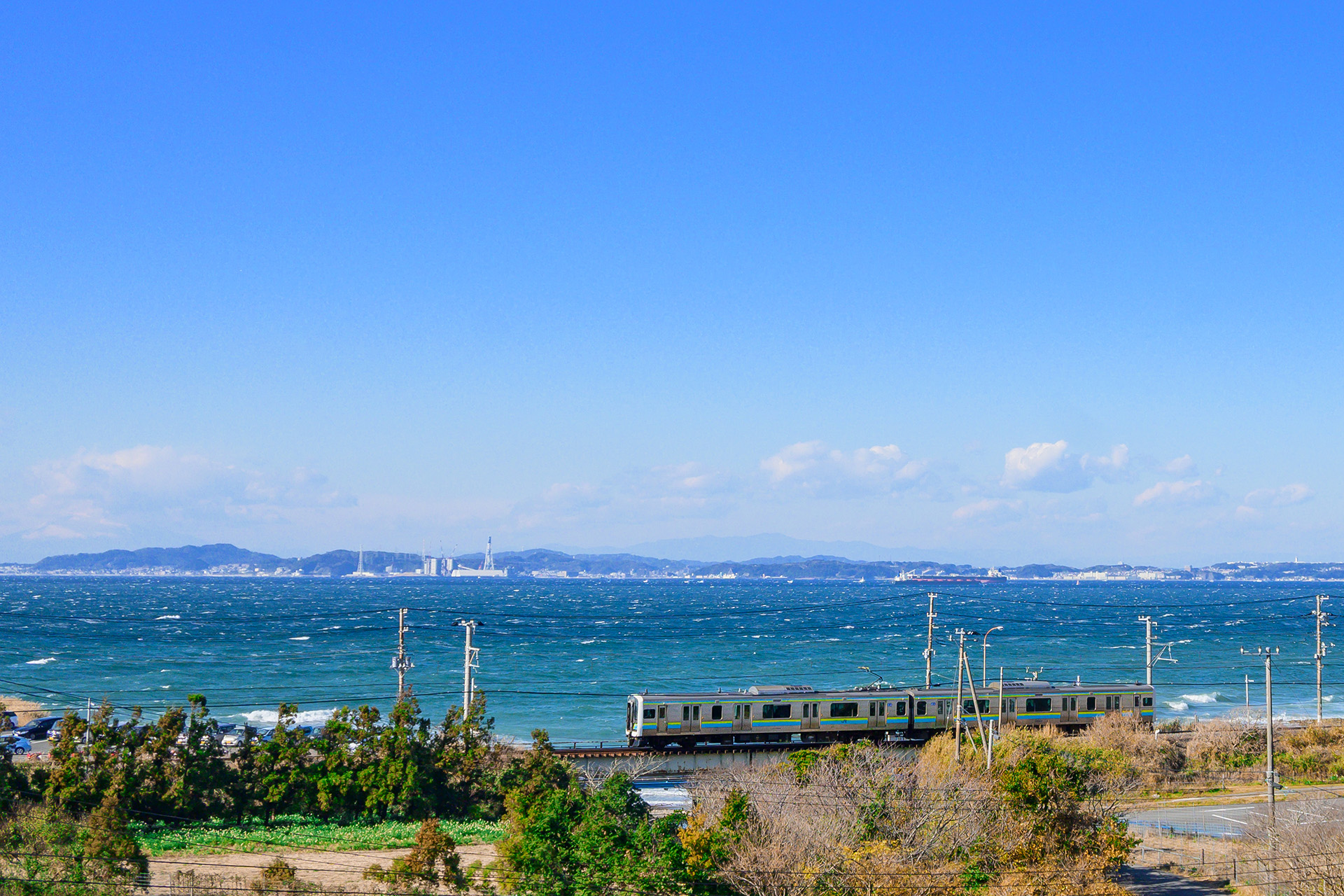 The JR Uchibo Line riding along the Chiba side of Tokyo Bay.
The JR Uchibo Line riding along the Chiba side of Tokyo Bay.
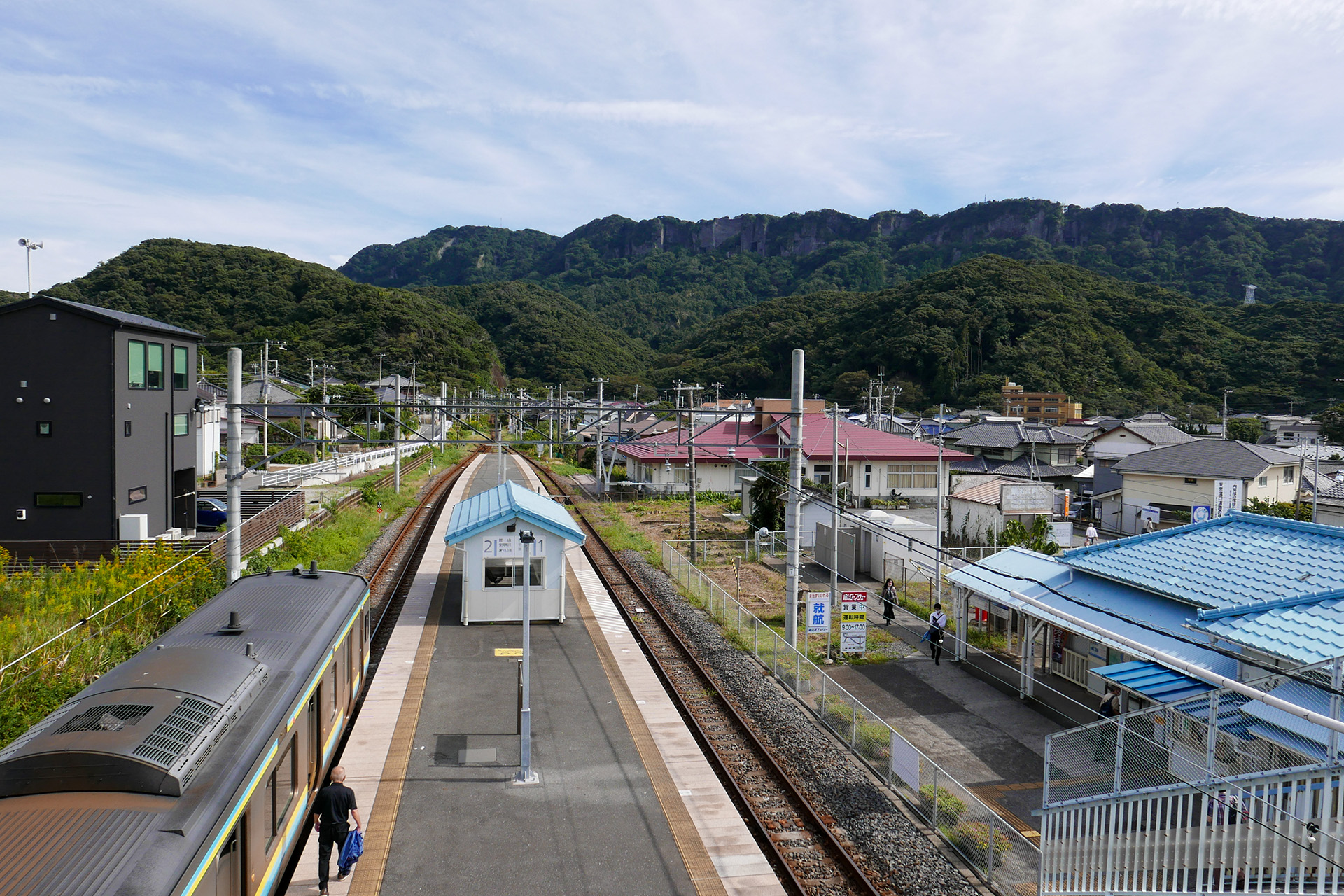 JR Hamakanaya Station with Mt. Nokogiri in the background.
JR Hamakanaya Station with Mt. Nokogiri in the background.
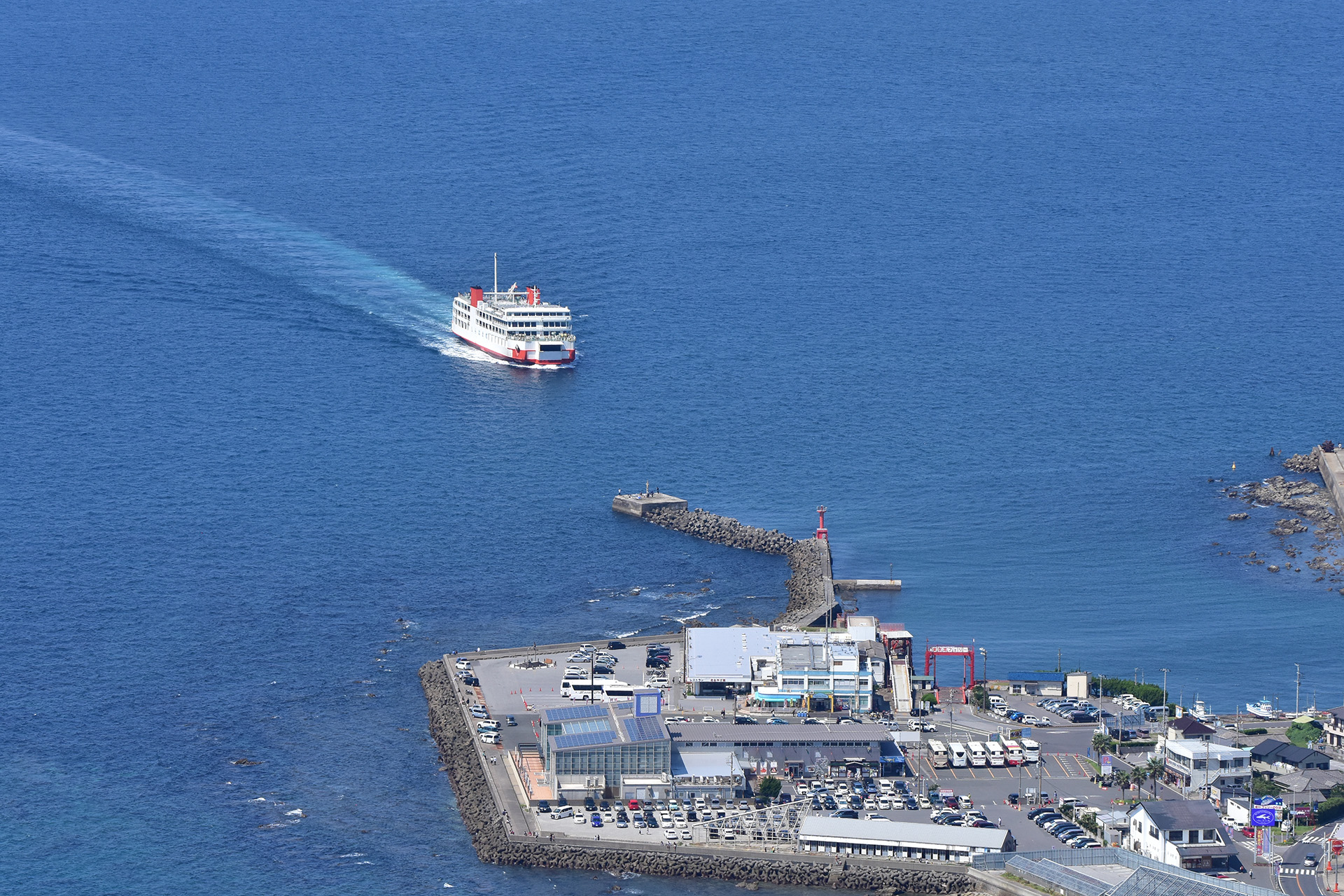 The Tokyo Bay Ferry arriving at Kanaya Port.
The Tokyo Bay Ferry arriving at Kanaya Port.
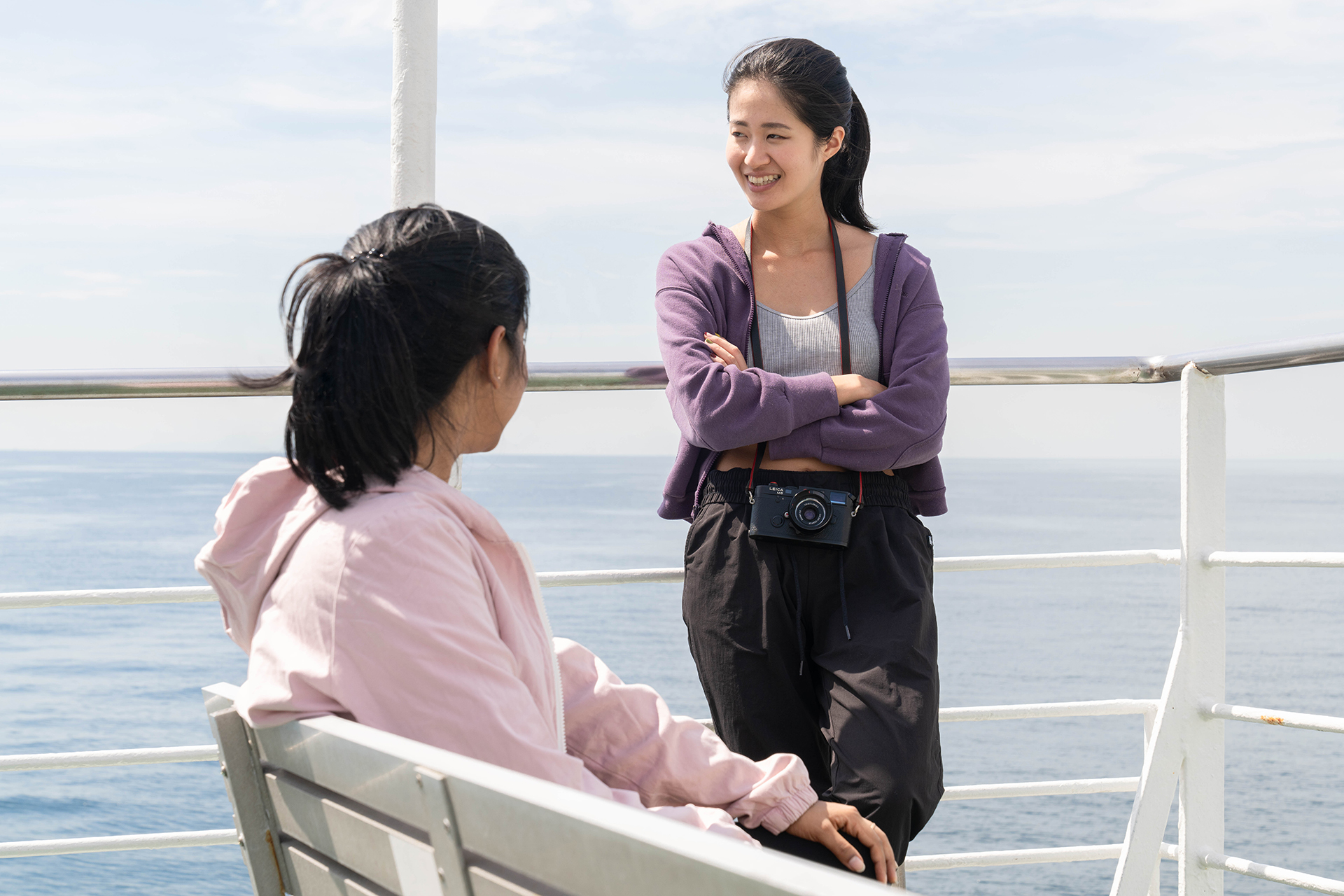 Our ride on the Tokyo Bay Ferry.
Our ride on the Tokyo Bay Ferry.
For those who want to explore the Kanaya area before heading straight for Mt. Nokogiri, a facility named “Kanaya Station” is the place to start. The entrance to the building serves as a tourist information center, helping you learn more about what the area offers. Step further into the building for your first taste of Kanaya hospitality at Al porto Cafe, aptly named for the Italian word for “port.” The cafe is run by a local couple with roots in three continents who ultimately decided to settle here in Chiba. Teruaki Yoshimura is originally from this area, but met his wife Ema while studying English in New York. Ema, originally from Italy herself, accompanied Teruaki on his return to Chiba, and now she has become part of the Kanaya community.
Here at Al porto Cafe, visitors can enjoy Ema’s fresh, handmade Italian pasta dishes made with locally sourced ingredients. She also uses locally roasted NOKOGIRI Mountain Coffee beans to craft both her coffee drinks and handmade tiramisu. When we asked about her adopted home, she said that the area offers visitors “a perfect adventure” just outside Tokyo, and that she’s found it rewarding to serve customers who “come to enjoy the traditional Italian food made with Chiba local ingredients.” As we sat chatting with Ema, sipping on coffee and sampling the tiramisu, we were certainly glad we stopped here for a respite during our Kanaya adventure.
Open 11:00 AM – 5:00 PM, Closed Tuesday, Wednesday, and Thursdays
Information as of December 2023, please see their website (Japanese) for the latest information:
https://kanayast.com/
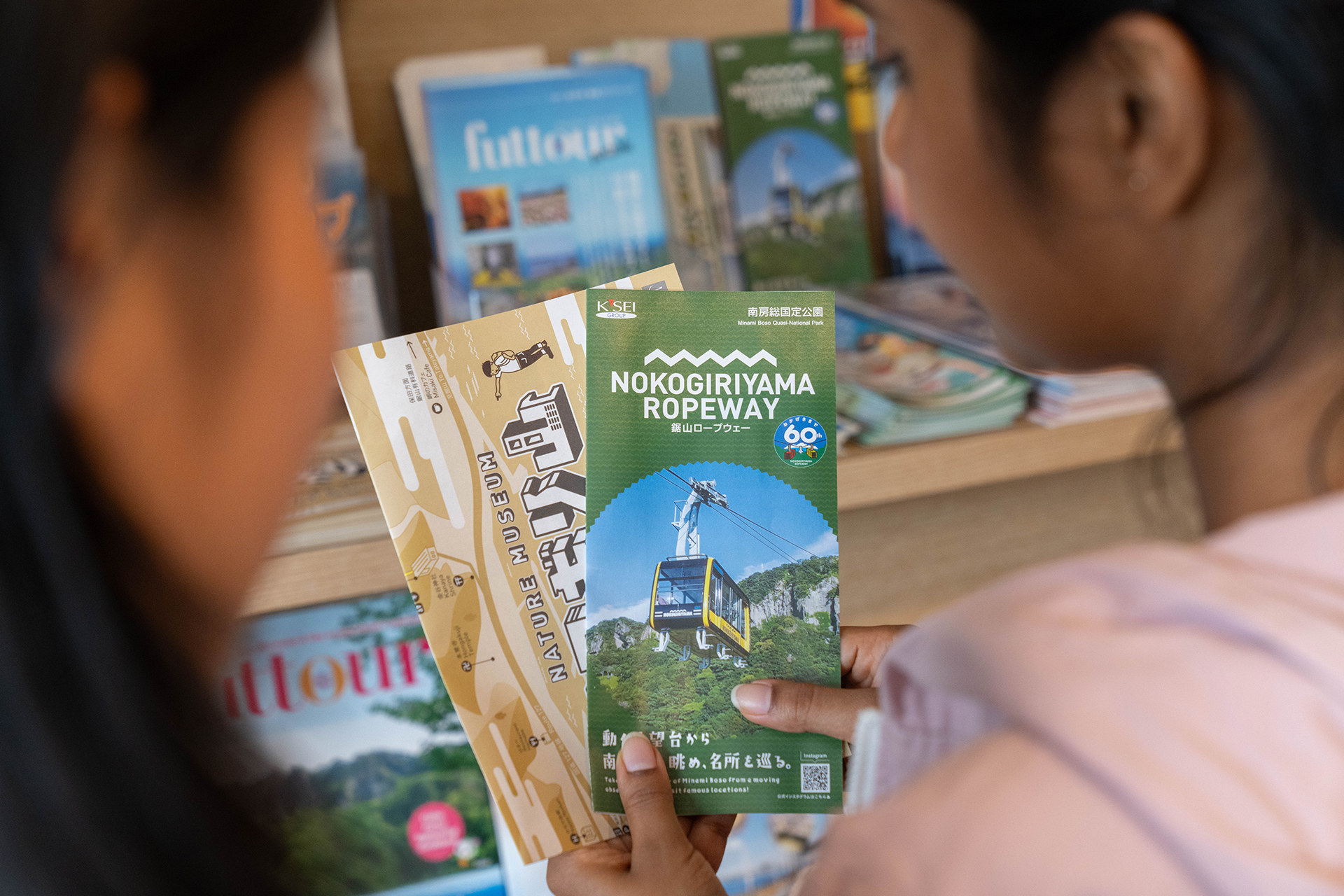 Checking out the tourist information.
Checking out the tourist information.
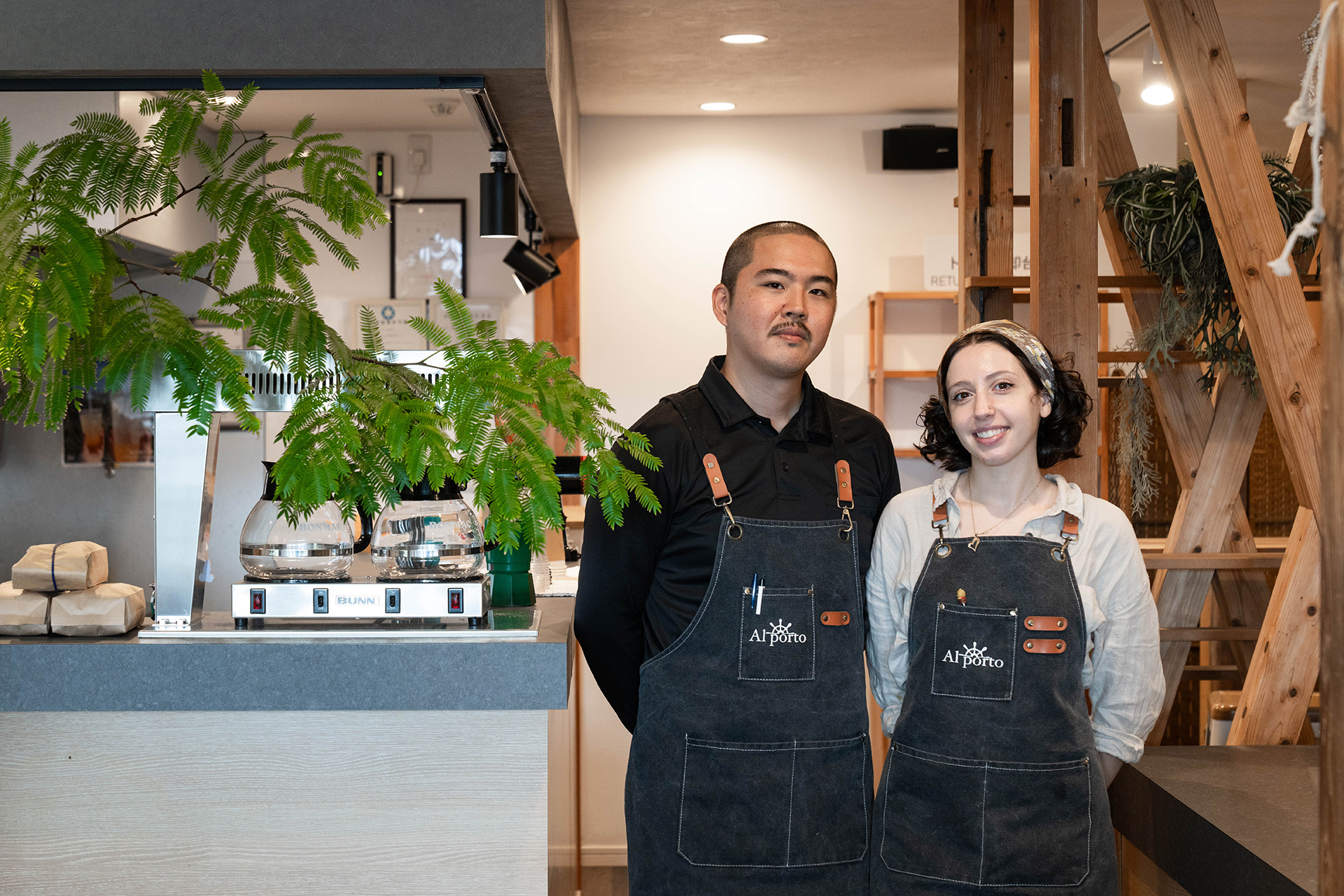 A friendly welcome from Teruaki and Ema at La porto Cafe.
A friendly welcome from Teruaki and Ema at La porto Cafe.
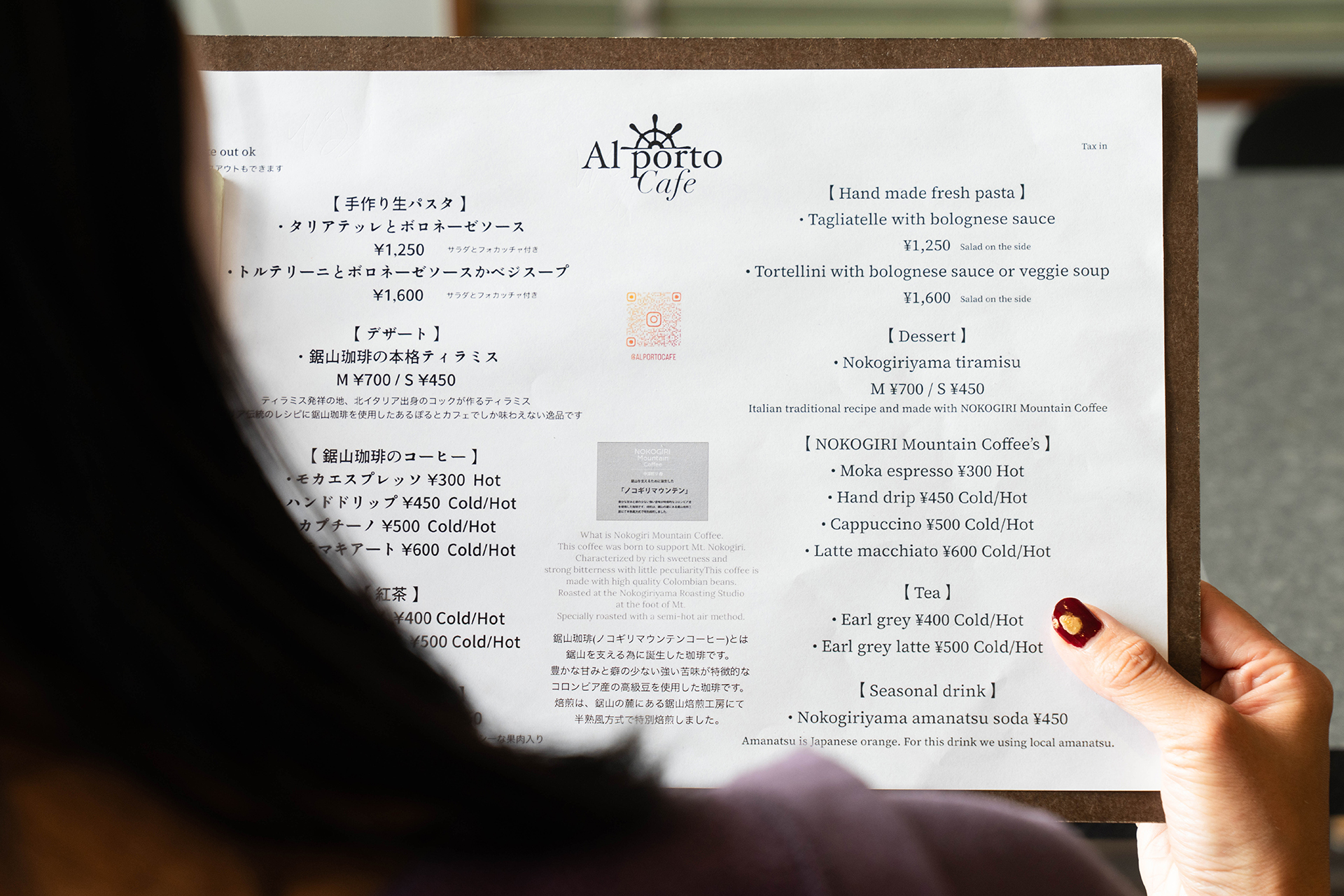 Checking out the menu.
Checking out the menu.
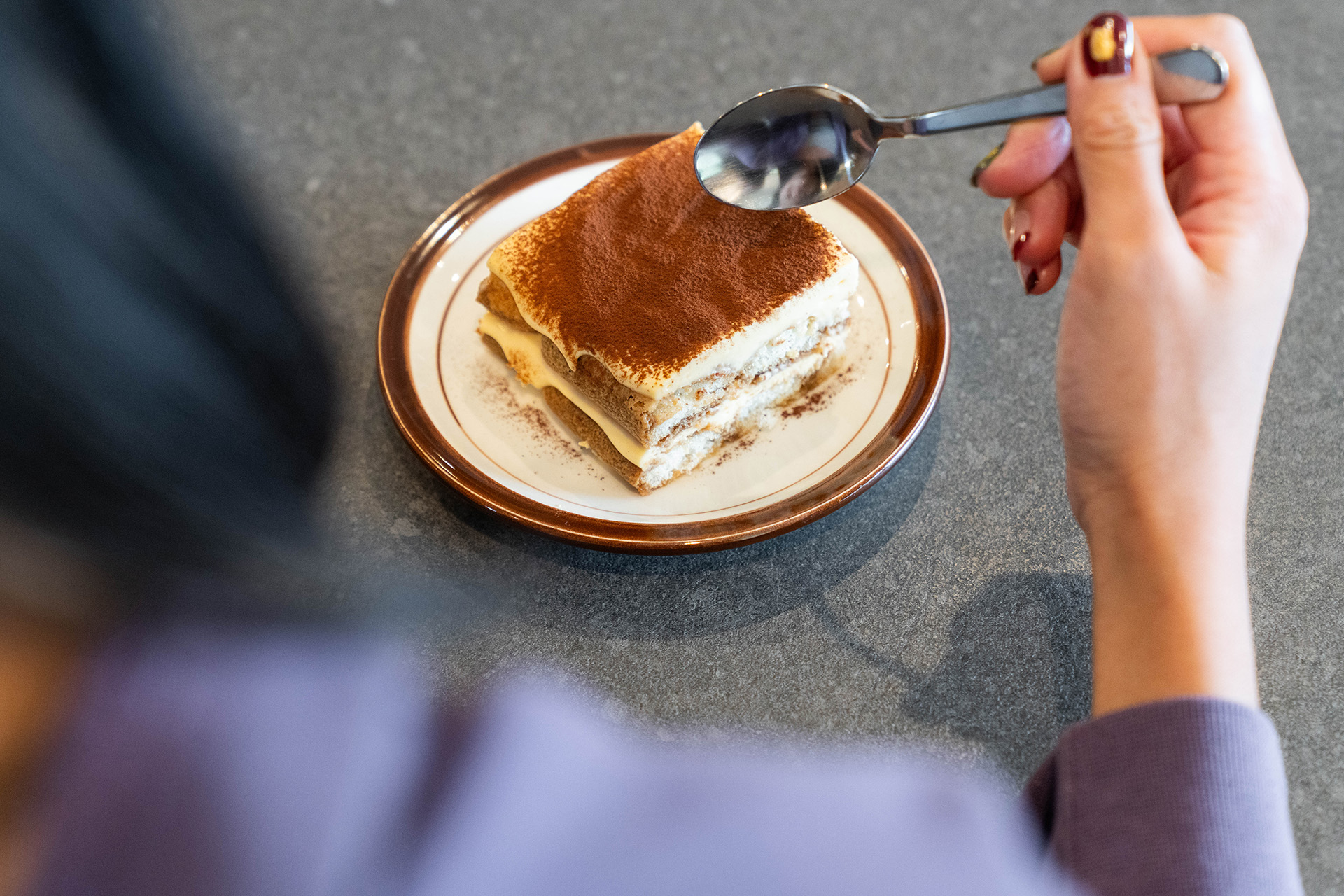 Sampling the handmade tiramisu.
Sampling the handmade tiramisu.
Mt. Nokogiri originally earned its name Nokogiriyama, which means “saw mountain” in Japanese, due to its sawtooth-like profile. The mountain was once used as a stone quarry, and this accentuated its already rugged shape by leaving behind dramatic vertical cliff faces. Today however, the old quarry grounds are the home of Nihon-ji Temple, with many sacred stone Buddhist statues carved into and around the mountain trails. Thus in many ways, Mt. Nokogiri is both a natural landmark, and a work of art shaped by human endeavor.
The Nokogiriyama Museum of Art was originally founded as a way to keep the area’s legacy alive as a place where “stone” and “art” come together. The building itself is shaped to resemble the unique rectilinear profile of Mt. Nokogiri, and parts of it were built using boshu-ishi stone, the prized stone the mountain was originally mined for. The inside of the museum houses temporary exhibits, and depending on the time of your visit, you’ll be able to see different collections of works on display. A variety of pieces by local artists have been donated to the museum throughout the years too, like the sculptures you’ll see adorning the lawn. A preserved Meiji era (1868–1912) storehouse also stands at the back of the property, exhibiting items of historic importance to the area.
For admission information and opening hours (in Japanese), please visit: https://nokogiriyama.com/
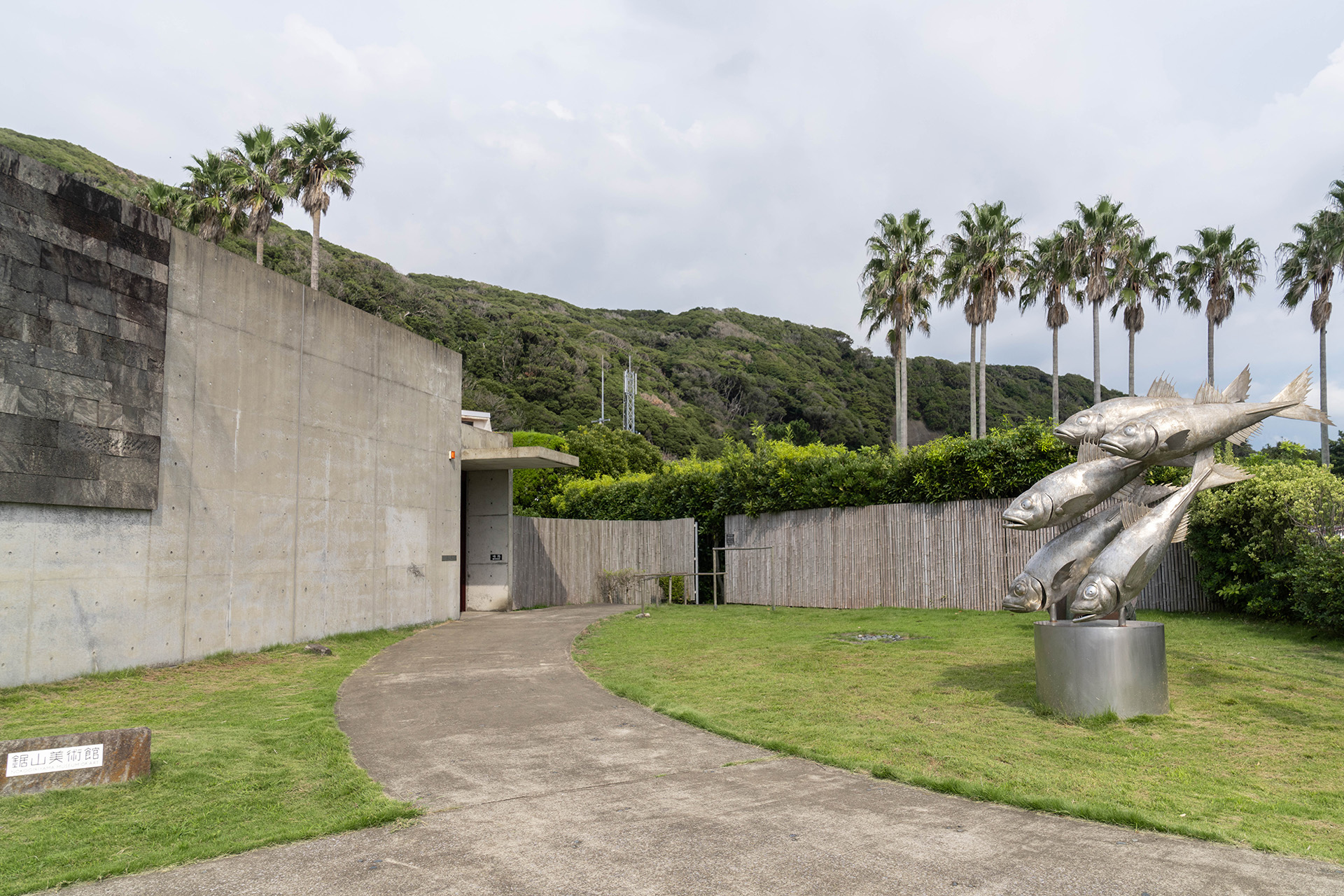 The exterior of the museum.
The exterior of the museum.
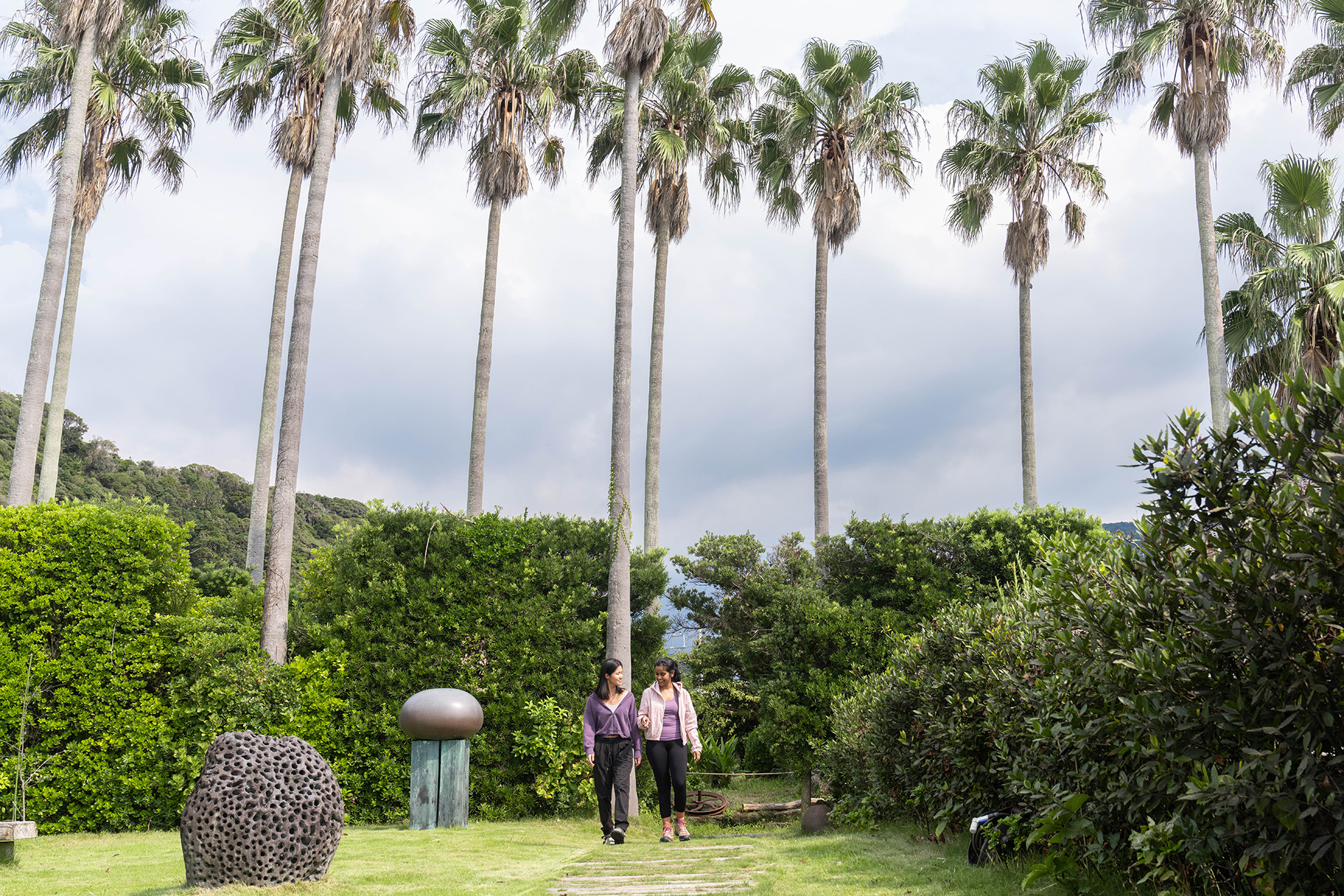 Strolling through the lawn.
Strolling through the lawn.
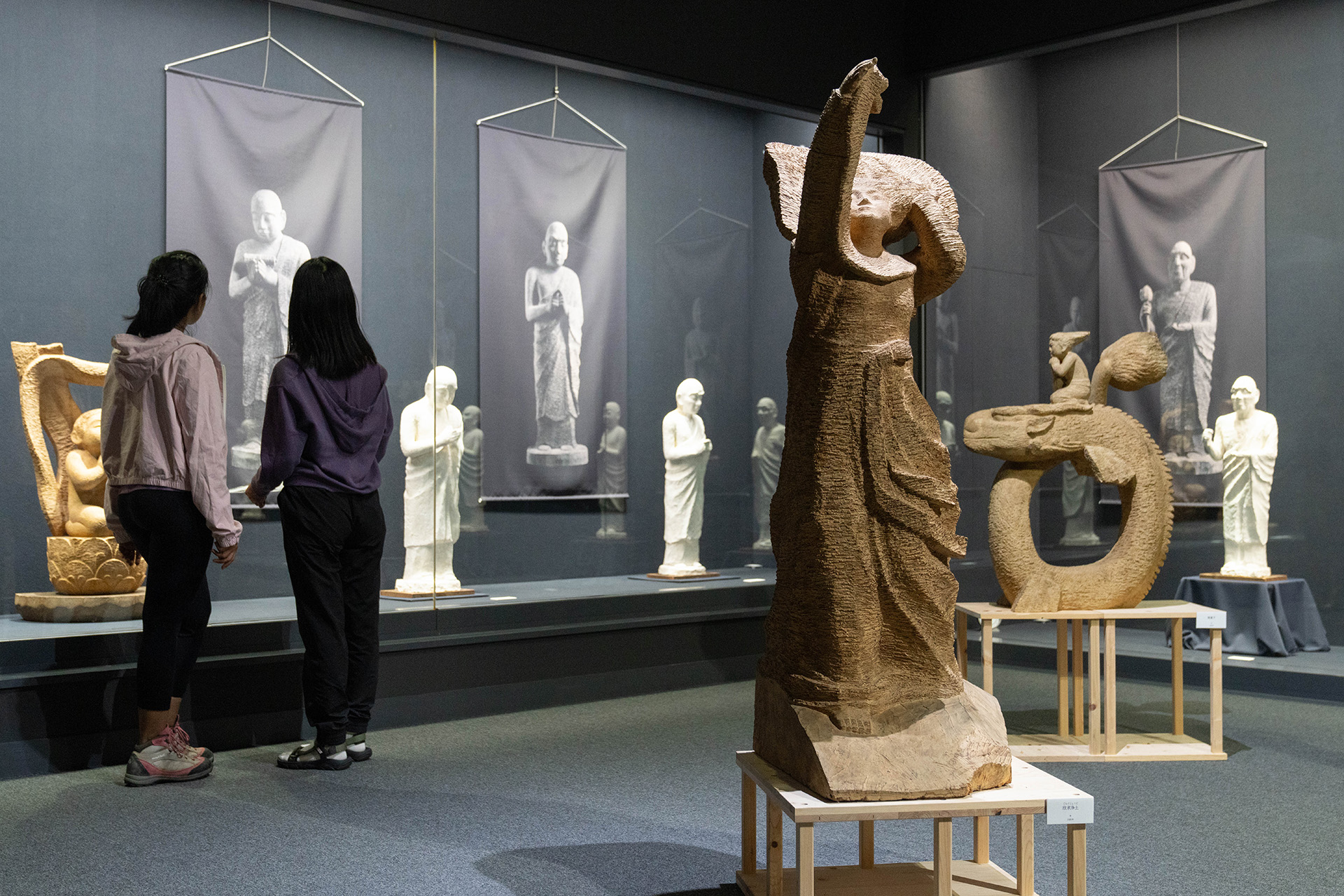 Depending on the time of your visit, you can enjoy different temporary exhibits.
Depending on the time of your visit, you can enjoy different temporary exhibits.
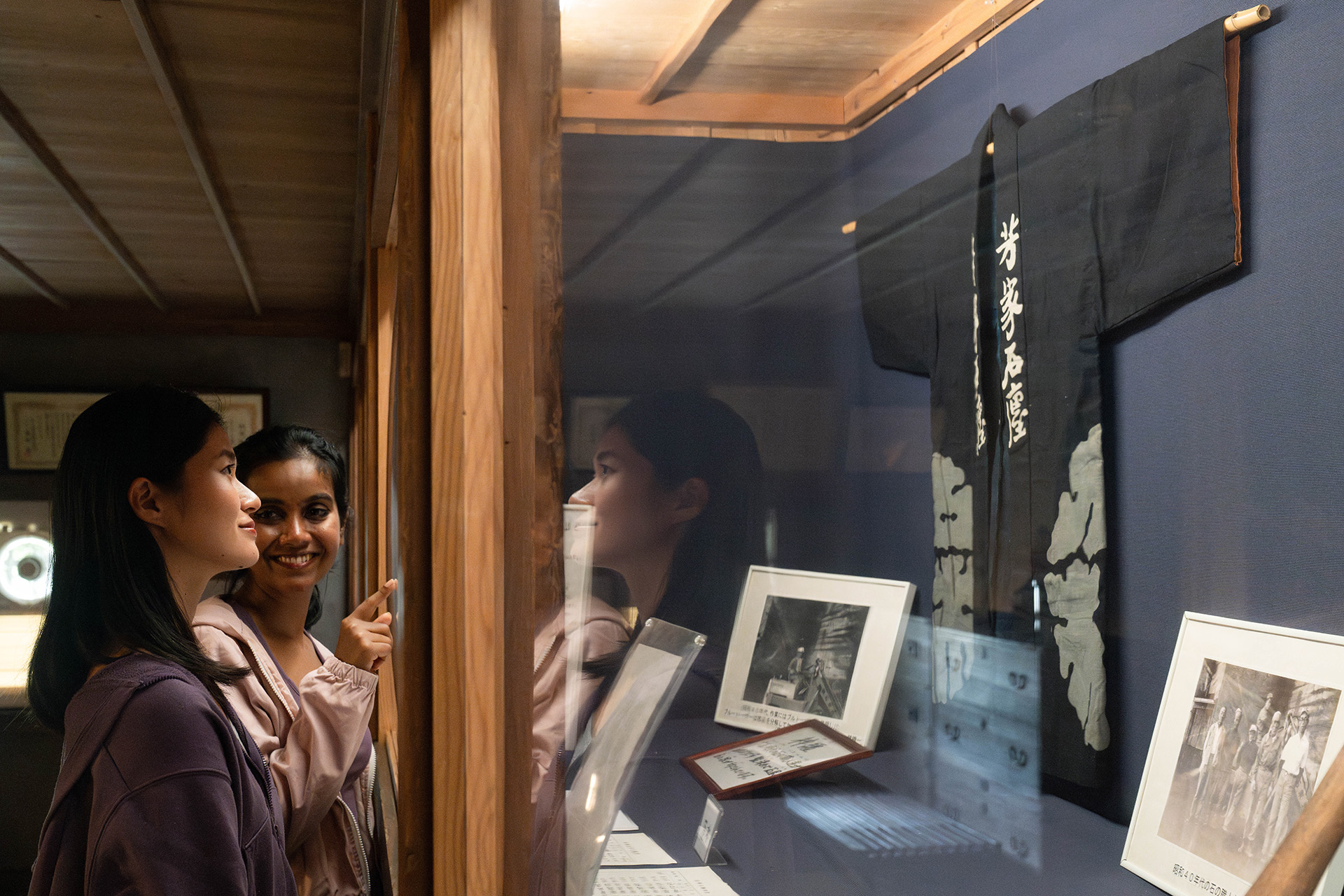 Checking the items on display in the old Meiji era storehouse.
Checking the items on display in the old Meiji era storehouse.
After you’ve learned a little about the boshu-ishi stone excavated from Mt. Nokogiri, you may want to see how it’s still being put to use around town. One way to satisfy that curiosity, and also your appetite, is to enjoy a pizza cooked in the boshu-ishi stone oven at Pizza GONZO. Their mainstay pizzas are classics like their margherita and marinara, but their menu also features seasonal specials topped with locally procured ingredients.
Open Monday through Thursday 11:00 AM – 3:00 PM.
Information as of December 2023, please see their website (Japanese) for the latest information:
https://pizzagonzo.jp/kanaya.php
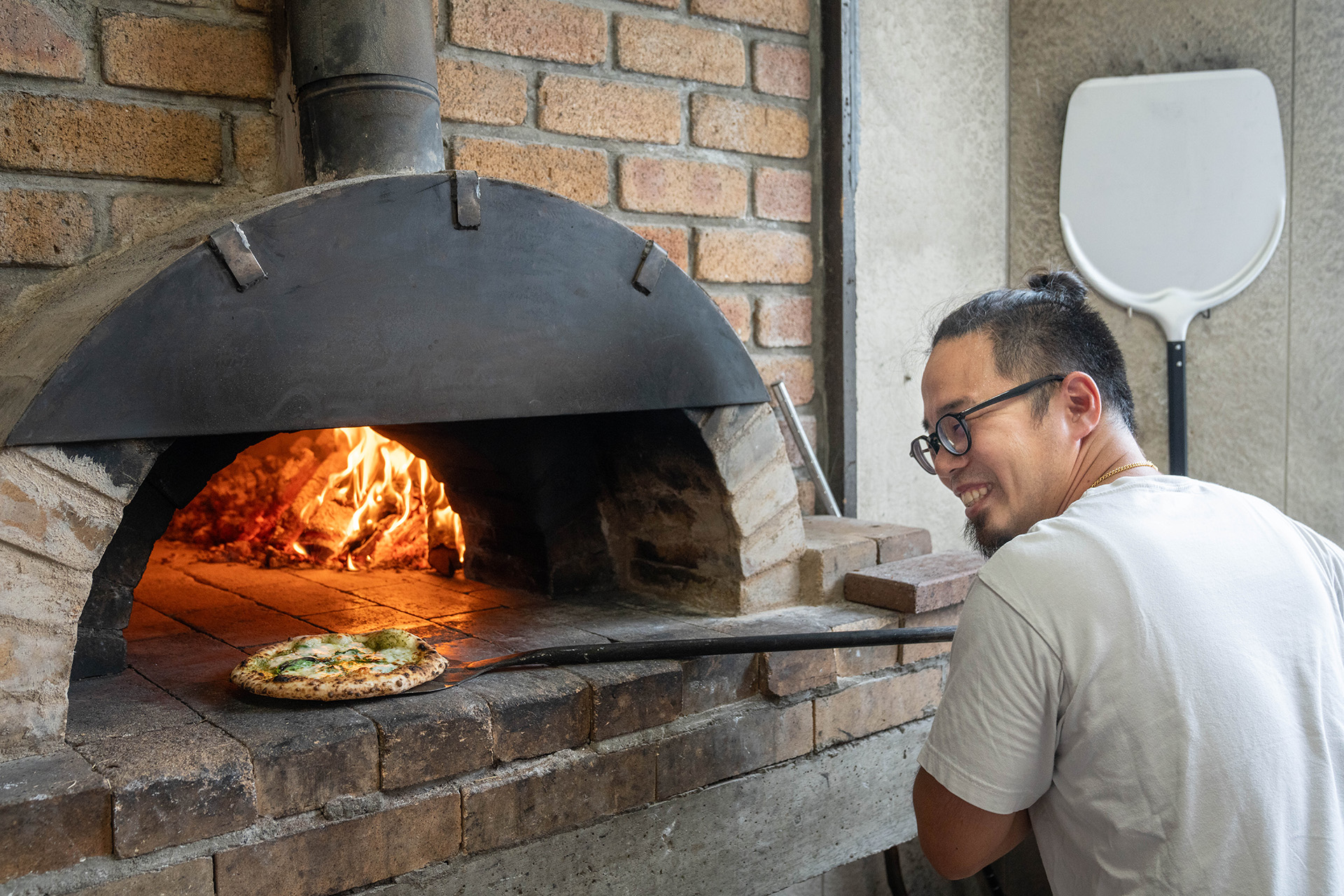 Taking a pizza out of the 'boshu-ishi' stone oven.
Taking a pizza out of the 'boshu-ishi' stone oven.
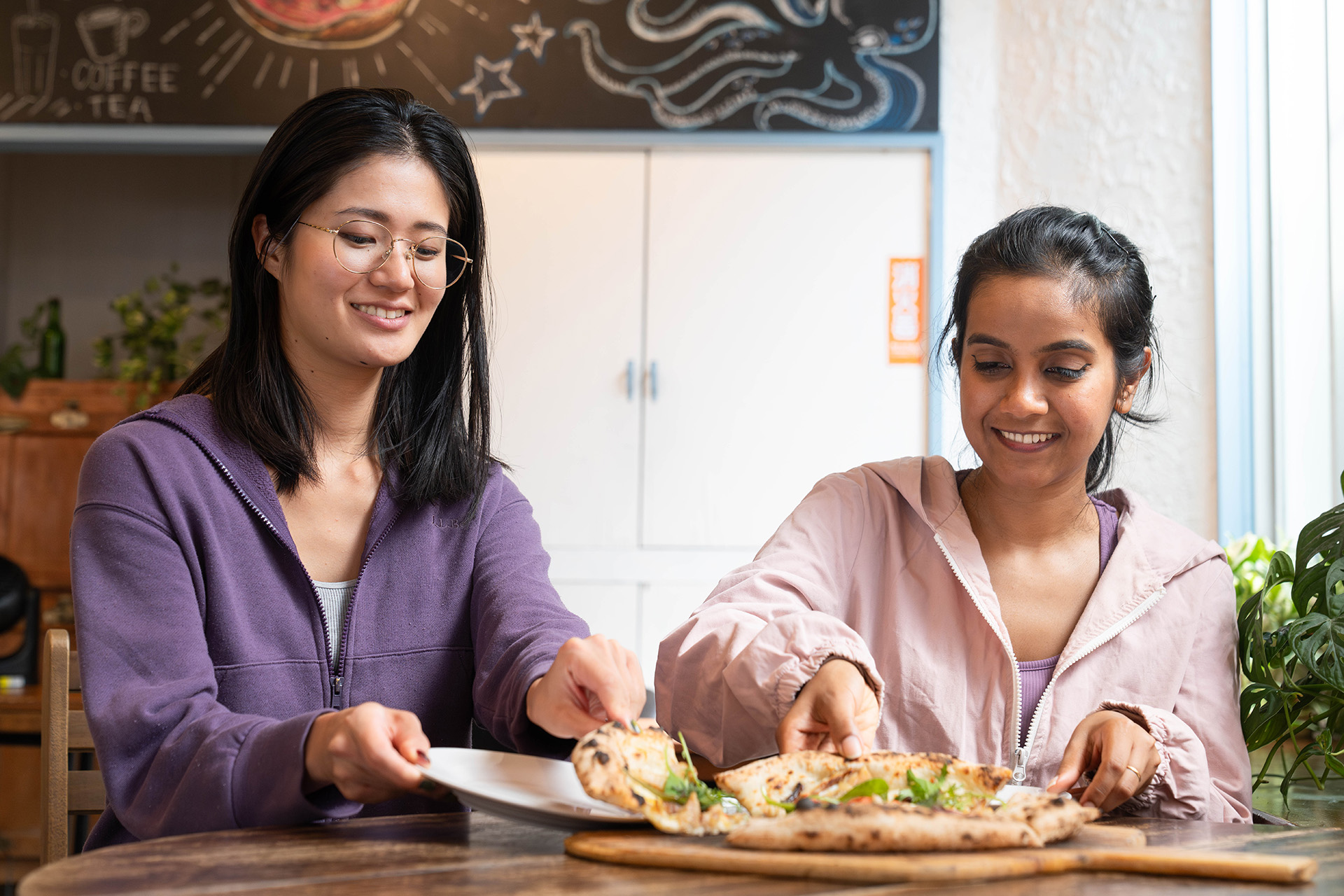 Trying some of the pizza fresh from the oven.
Trying some of the pizza fresh from the oven.
If you’re looking to do some souvenir shopping at the end of your day, we recommend a stop at Hammers, a market located within a complex called The Fish. Here you can peruse hundreds of local food products and Chiba-inspired goods. Look out for the mysterious red creature named Chiba-kun, the official mascot of Chiba Prefecture, while you’re here!
Open from 9:30 AM – 6:00 PM on weekdays, and 9:00 AM – 6:00 PM on weekends and holidays.
Information as of December 2023, please see their website (Japanese) for the latest information:
https://thefish.co.jp/
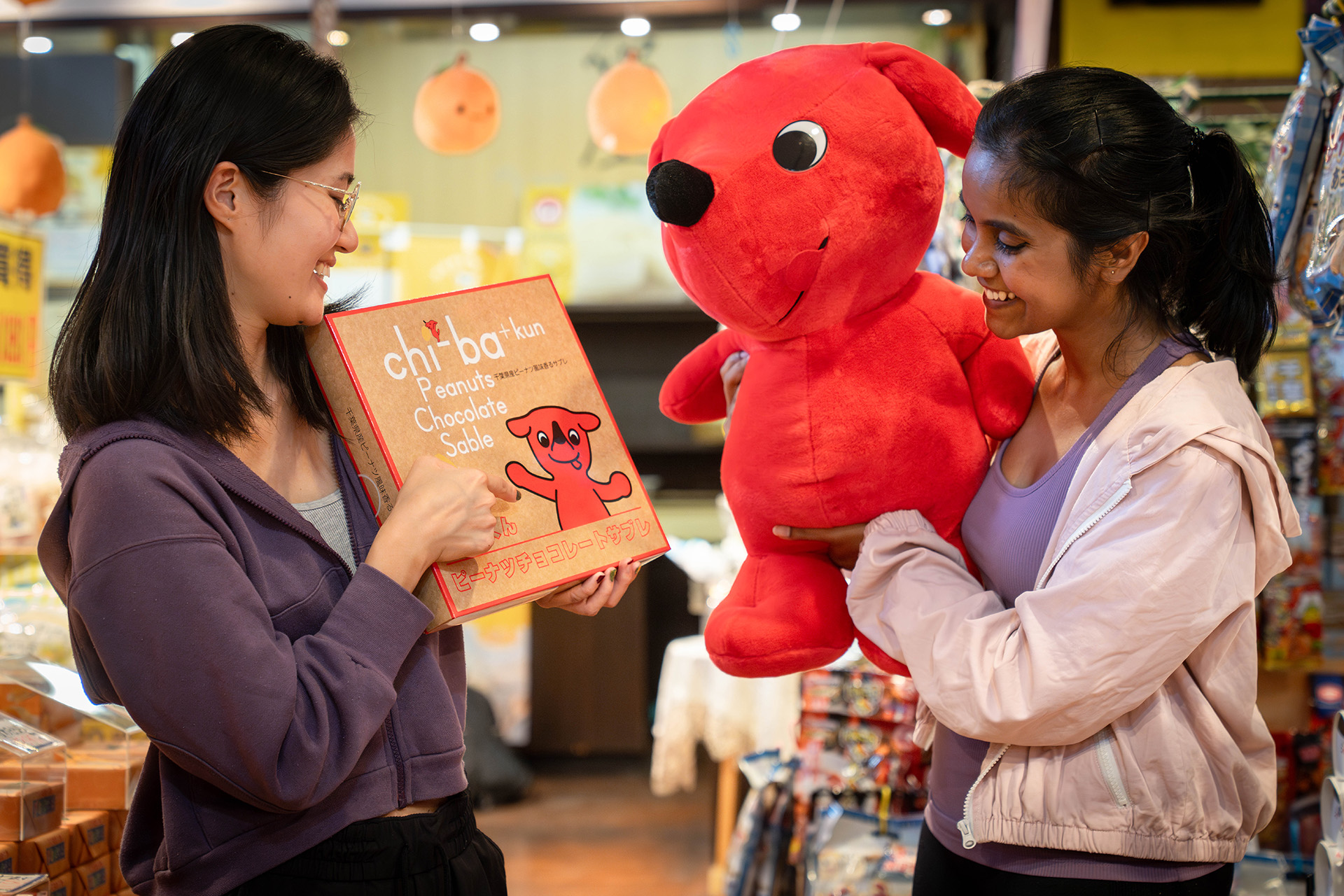 Shop here for Chiba-kun goods and local food products.
Shop here for Chiba-kun goods and local food products.
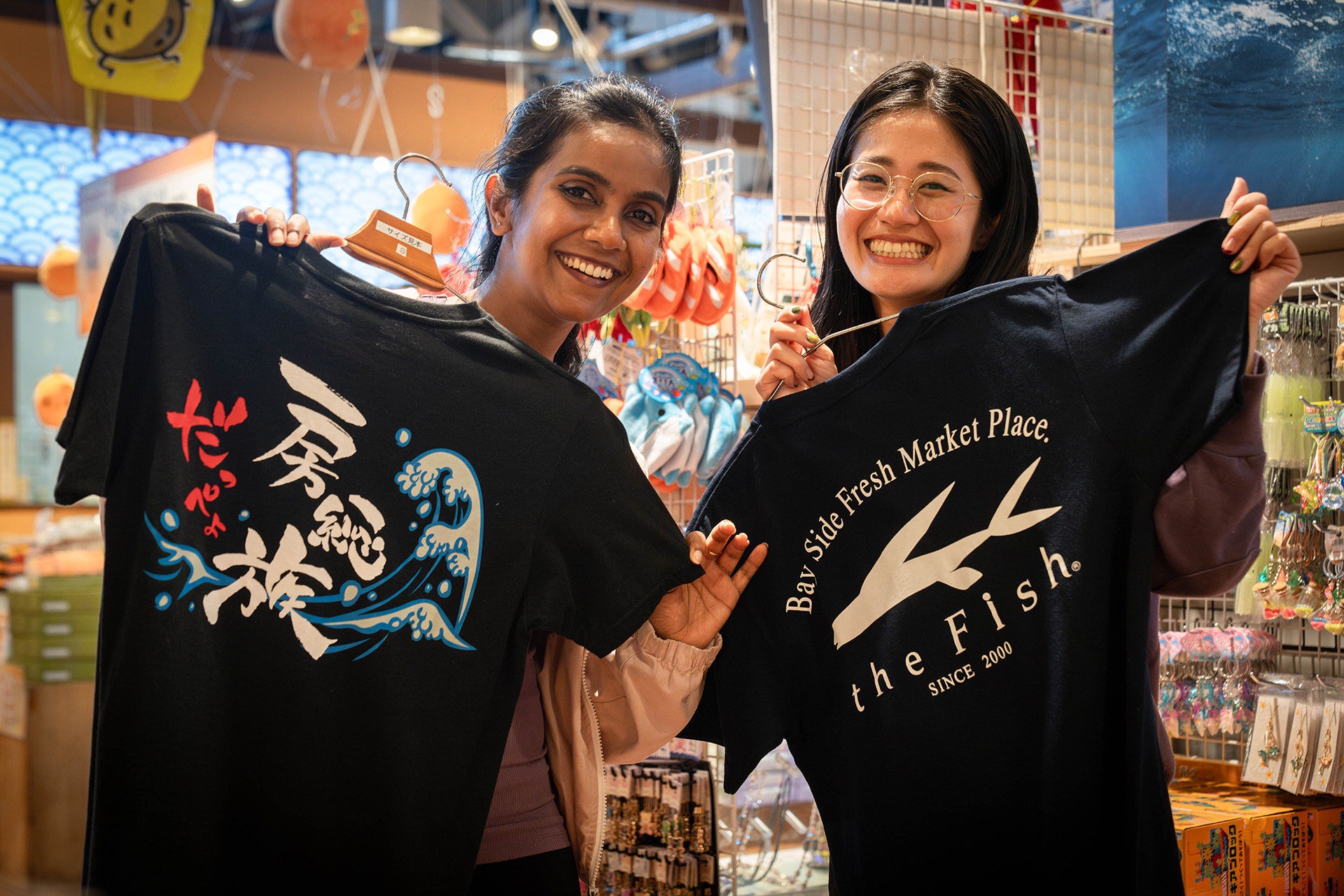 Don't forget a t-shirt to commemorate your trip.
Don't forget a t-shirt to commemorate your trip.
Most overseas tourists who visit Mt. Nokogiri come just for a day, and return to their lodgings in Tokyo before evening arrives. As we stated at the start, the purpose of this guide is to help you plan a more immersive experience during your time here. By sticking around through the evening, you’ll also be able to discover the unique charm of a quiet Japanese port town at sunset. Therefore, it seems fitting that our last piece of advice is this: instead of heading straight back to the densely packed cityscape of Tokyo, stay a night surrounded by the mountains and the sea at BAYSIDE KANAYA.
The rooms here, aptly named “Glamcottages,” are lined right up along the sea, putting the evening Tokyo Bay sky right before you. A seaside deck is attached to each room, allowing you to bask in the beauty of golden hour while also listening to the sounds of the sea. You won’t even have to leave the deck at dinnertime, as you’ll find it equipped with a grill, and the dinner here is served as a full barbecue course that’s brought right to you, complete with a carefully selected lineup of local seafood, meats, fruits and vegetables. As you sit by the sea, savoring the local flavors, take a moment to appreciate that you’ve discovered a side to Japan that remains a hidden gem to most.
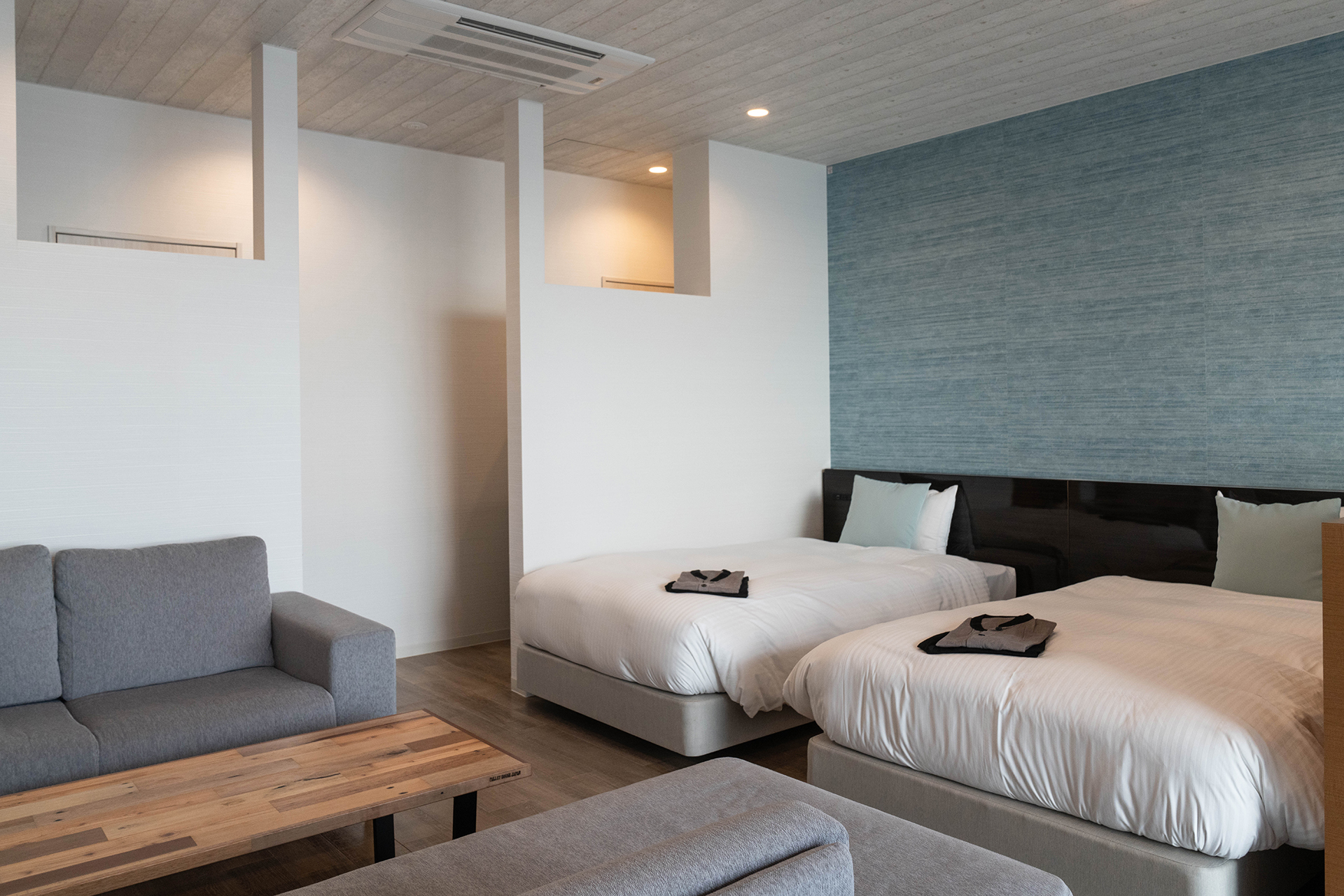 Inside our "Glamcottage"
Inside our "Glamcottage"
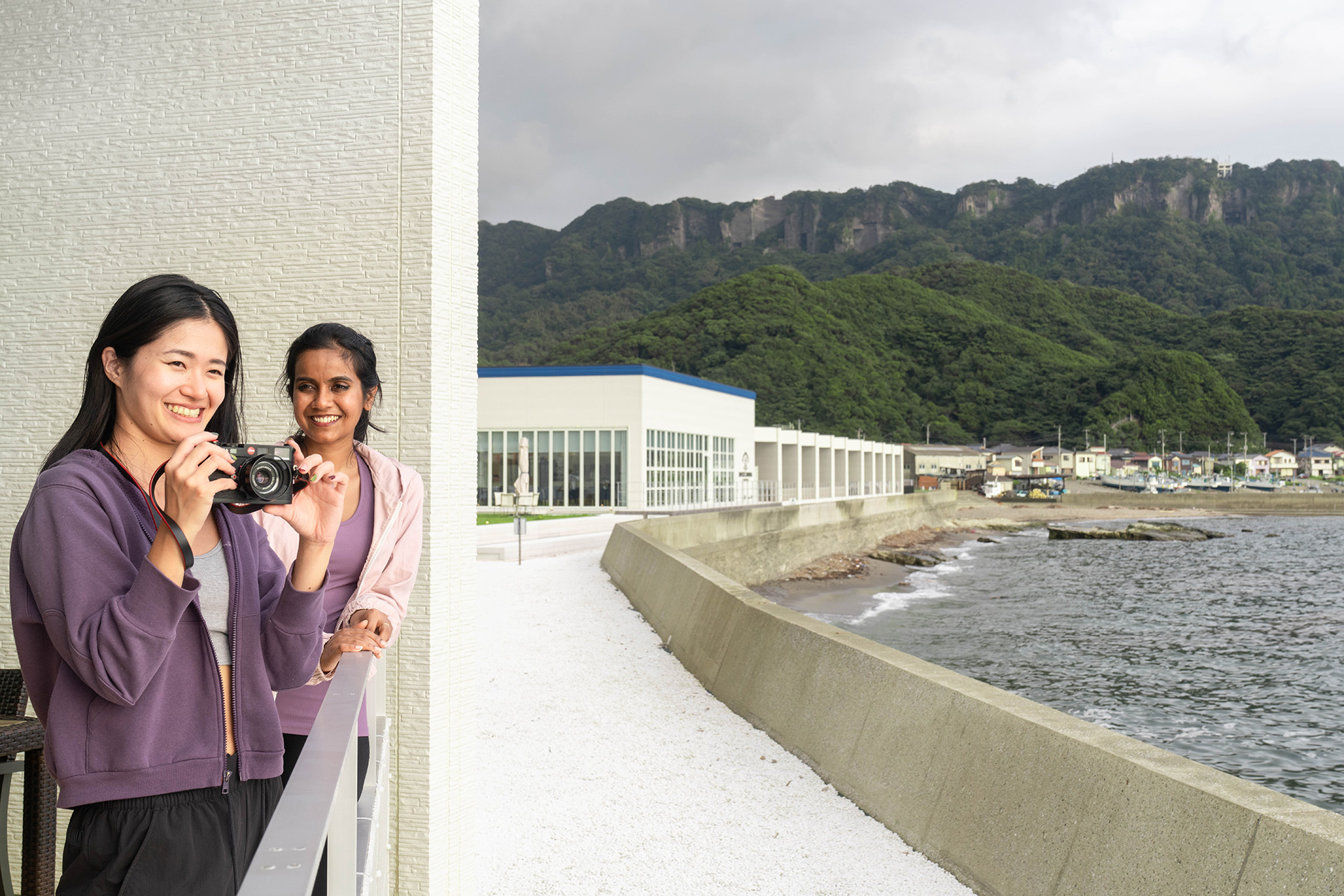 The view from our seaside deck with Mt. Nokogiri in the background.
The view from our seaside deck with Mt. Nokogiri in the background.
 Grilling up dinner...
Grilling up dinner...
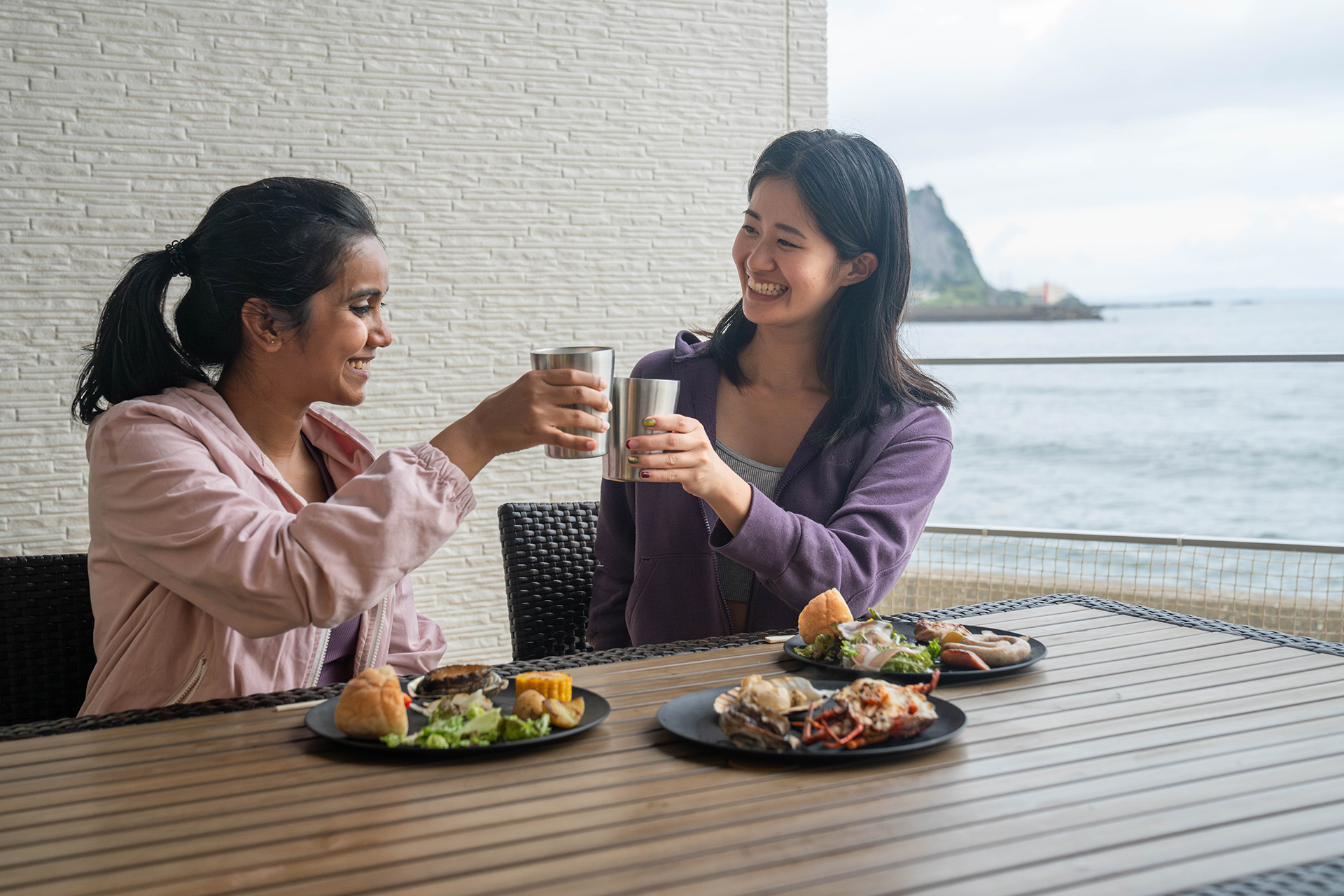 ...and a final kanpai to a day in Kanaya!
...and a final kanpai to a day in Kanaya!
Nokogiriyama, Kyonanmachi, Awagun
(Mt. Nokogiri Ropeway: About a 10-minute walk from Hamakanaya Station on the JR Uchibo Line or the Tokyo Bay Ferry Terminal at Kanaya Port.)
+81-439-69-2314 (Mt. Nokogiri Ropeway)
Accessibility
2175 Kanaya Station, Kanaya, Futtsu City
(A 3-minute walk from JR Hamakanaya Station.)
2146-1 Kanaya, Futtsu City
(A 5-minute walk from Hamakanaya Station on the JR Uchibo Line.)
+81-439-69-8111
3869-2 Kanaya, Futtsu City
(A 3-minute walk from JR Hamakanaya Station.)
2288 Kanaya, Futtsu City
(Located next to the Tokyo-Wan Ferry Terminal. A 6-minute walk from Hamakanaya Station on the JR Uchibo Line. )
+81-439-69-2161
2171 Kanaya, Futtsu City
(A 3-minute walk from JR Hamakanaya Station.)